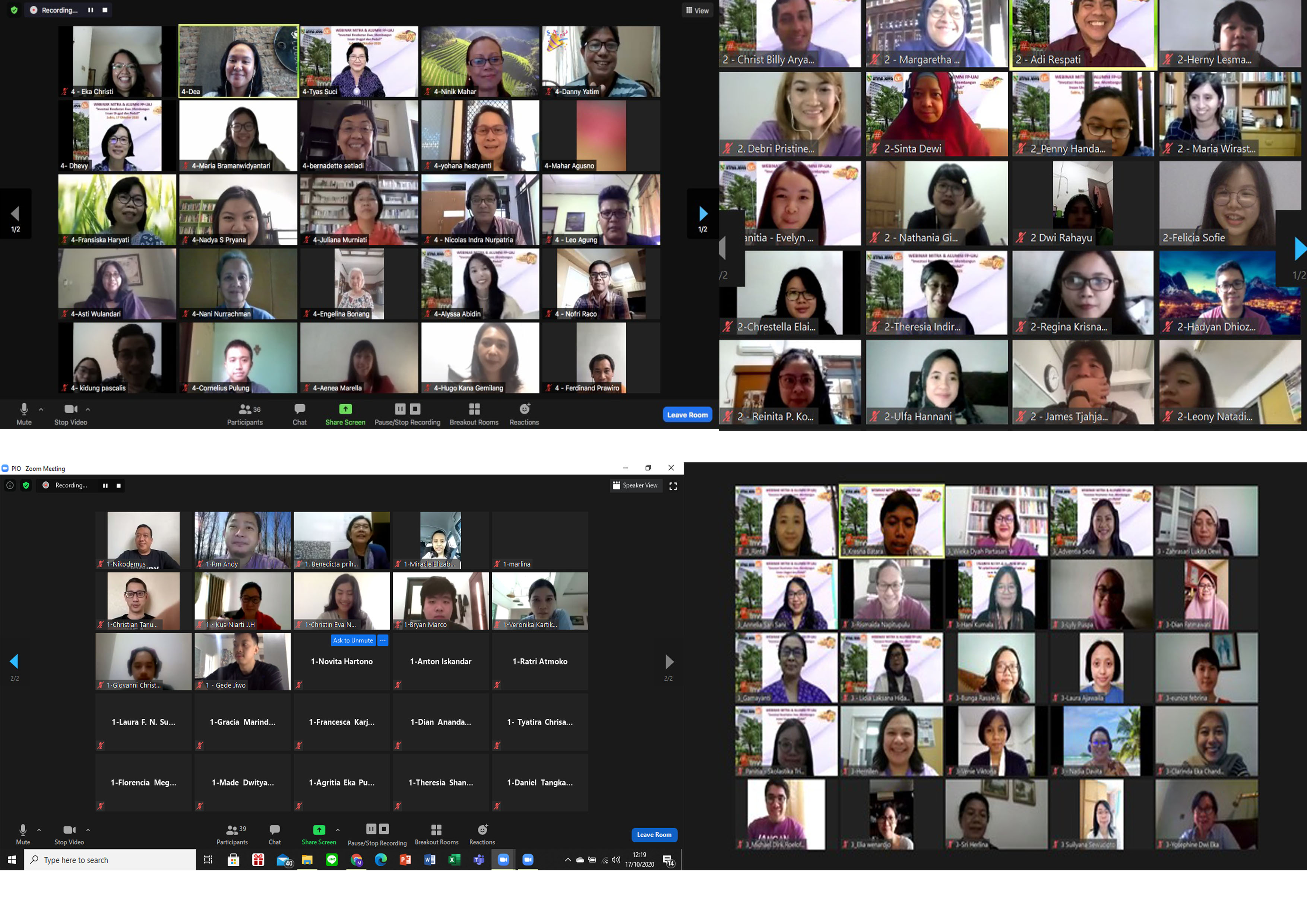
ASK
ME

REGISTER
NOW
22/10/2020
On Saturday, October 17, 2020. Faculty of Psychology UNIKA Atma Jaya (FPUAJ) had a webinar witht the theme of”For Indonesia, Building Collaborative, Excellent, and Caring Individuals,” as a part of its 28th birthday celebration. This webinar was attended by Dr. Theresia Indira Shanti, M.Si (Dean of Faculty of Psychology), Dr. Indria Laksmi Gamayanti, M.Si (Head of IPK Indonesia), 35 partners, lecturers, and 160 alumni class of 1993 to 2018 FPUAJ. This event was held to promote partnership among participants, also to showcase FPUAJ’s alumni and partners achievements. The webinar was grouped into 4 big groups per interest: Industrial and Organizational Psychology, Clinical Psychology, Educational Psychology, and Social Psychology. All topics were concerning issues relating to pandemic viewed in Psychological perspective..
There were 2 sessions for the Clinical Psychology interest. Annelia Sari Sani, S.Psi, Psy as the coordinator for IPK Indonesia work unit discussed what Covid-19 SATGAS (work unit) do to fight against covid19. This first session was informative with the explanation of the chain of command for requesting psychological aids that are more promotive and preventive in nature by IPK Indonesia..
Ever since the pandemic officially stated to hit Indonesia, IPK Indonesia has started to develop trainings for Early Psychological Support (Dukungan Psikologis Awal/DPA) with volunteers as there were not enough psychologists and psychiatrists to meet the needs. IPK Indonesia has started to create new psychological support programs, collaborating with ketua RT (neighbourhood watch head), village chiefs, regional hospitals, and local governments. All of this to help the psychological support to be implemented effectively.
The second session had Dr. Zahrasari Lukita Dewi, M.Si, Psikolog, as a lecturer in Clinical Psychology FPUAJ discussing matters related to telepsychology as the challenge for clinical psychologists during the pandemic is to do their work with their clients online instead of meeting in person. Telepsychology has advantages in that it opens access to clients from various regions who might be limited by physical distance; clients do not have to leave their home to have their sessions and it does save time and energy for both parties; it also has flexible scheduling. The disadvantages of telepsychology would be the lack of privacy room for he client, difficulties to do a whole observation, internet connection problem, clients’ demographic background, and the likelihood of privacy breached for using third party online application.
Organizational and Industrial Psychology materials were presented by Natalia Suwignyo, S. Psy., M.Si (HC practitioner) and Puji Tania Ronauli, M.Psi (a lecturer of Organizational and Industrial Psychology interest at FPUAJ). The topic for this was how to maintain employees’ well-being during the pandemic as work systems within companies and organizations would underwent drastic changes. Companies are required to make a work from home system which would come with its own challenges for the companies and their employees. These challenges, added with the uncertainty of one’s job security could affect employees’ well-being. To improve and maintain employees’ well-being, a positive environment is needed. This could be achieved by having employees, managerial or employees’ unit, and the leaders of the organization all are willing to work together harmoniously.
The steps necessary to achieve the congruent relationship among the three parties are by accepting the changes, realizing that the changes happen globally and they are inavoidable, putting health first, increasing level of tolerance, making short term goals, creating a supportive environment (counselling, coaching, virtual gathering), appreciating one another, having positive communication, and managing stress and crises effectively. Those might not be easy to be done due to other companies’ problems that were more demanded, but one way to increase quality of work in the work place and to prevent burnt- out is by paying attention to employees’ well-being.
For the Educational Psychology material, it was delivered by Dr. Margaretha Pruwanti, M.Si. Dr. Purwanti discussed of the fatigue faced by students, teachers, and parents during this pandemic which requires online learning as schools are closed. Materi seminar kelompok pendidikan dibawakan oleh Dr. Margaretha Purwanti, M.Si., Psikolog mengenai para siswa, guru, dan juga orang tua yang mengalami kejenuhan selama masa pandemi ini. Students were facing the possibility of demotivation, teachers having problems to adapting to different teaching methods that relied on technology, not to mention the curriculum has to be modified to meet this special circumstance. Parents also having problems to find (creative) ways to help their children in this online learning situation.
One solution to help students to be motivated and able to learn comfortably is by modifying learning, including policies and rutels, materials, methods, evaluation, and communication. Studens can explore learning sources and their own potentials. Teachers are guided to adapt to current technology, and to produce creativity and innovation in their teaching. Parents can optimalize their accompanying their children based on their children’s needs.
For Social Psychology group, Nicolas Indra Nurpatria, M.Si., Psikolog discussed psychosocial and mental health support which covered all local supports by communities in dealing with this crisis. It also included supports from external sources outside one’s community. The aim for this psychosocial support and mental health from those various soruces is to keep and promote psychosocial well-being.
There are several psychosocial and mental health support strategies: coordinating with stakeholders, sounding of needs in psychosocial and mental health field, intervention through pyschoeducational approaches, systematically gathering facts about mental health issues and related matters witht he goal of strengthening ways to overcome the crisis situation at hand. Another strategy that can be applied is to do intervention through various services and interventions to increase or strengthen the communities’ capacities. The general society has an important role to prevent the psychosocial impact of the pandemic and to build social safety net.
